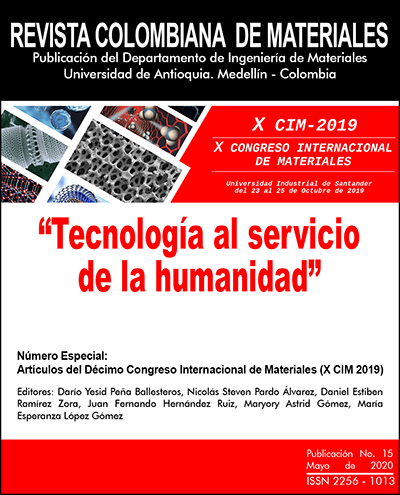Production of nanostructured ausferrite in alloyed and non-alloyed ductile iron
DOI:
https://doi.org/10.17533/udea.rcm.342073Keywords:
ductile cast iron, austempering, nanostructure, ausferriteAbstract
Austempered ductile cast iron (ADI) is a material with exceptional mechanical properties with potential applications in the automotive, agricultural and mining industries. The microstructure of ADI consists on well formed graphite nodules in a matrix of ausferrite (bainitic ferrite + high carbon austenite). In this ductile iron, the ausferritic matrix is obtained by austenitising followed by austempering heat treatment carried out under specific conditions of time and temperature. In this work, the effect of the austempering parameters were studied in order to produce nanostructured bainitic ferrite. The study was conducted in two ductile irons with chemical compositions 3.45C-2.72Si-0.80Ni-0.6Cu (wt%) and 3.53C-2.66 Si-0.12Ni-0.01Cu (wt%). The austenitization conditions were 900 °C for 2 hours. The austempering temperatures were 200 °C and 230 °C for the first alloy (high Cu- high Ni) and 215 °C and 245 °C for the second alloy (low Cu-low Ni). The austempering times were 0.5, 1, 2, 4, 8, and 10 hours for both alloy systems. The chemical and microstructural characterization were conducted by using optical emission spectrometry, optical microscopy, scanning electron microscopy and X-ray diffraction techniques. The results indicate that the microstructure produced by the austempering process depends strongly on temperature and transformation time. The higher volumetric fraction of bainitic ferrite was reached at the longest transformation times. The time to obtain the highest fraction of high carbon austenite decreases with temperature. Cu and Ni do not have a clear influence on the formation of ausferrite. The bainitic ferrite produced is between 7-70 nanometers thick.
Downloads
References
H. K. D. Bhadeshia, BAINITE IN STEELS Transformations, Microstructure and Properties, IOM Commun. 2001.
S. K. Putatunda, S. Panneerselvam, and M. Alshwigi, “Development of nanostructured austempered ductile cast iron (ADI),” ASM Int. - 28th Heat Treat. Soc. Conf. HEAT Treat. 2015, pp. 71–75, 2015.
S. K. Putatunda, S. Kesani, R. Tackett, and G. Lawes, “Development of austenite free ADI (austempered ductile cast iron),” Mater. Sci. Eng. A, vol. 435–436, pp. 112–122, 2006.
S. Savicevic, M. Vukcevic, M. Janjic, H. Avdusinovic, A. Gigovic, and Z. Jurkovic, “Influece of the Austempering Temperature on the Tensile Strength of the Austempered Ductile Iron ( Adi ) Samples,” Metalurgija, vol. 56, no. 1–2, pp. 149–152, 2017.
S. Panneerselvam, C. J. Martis, S. K. Putatunda, and J. M. Boileau, “An investigation on the stability of austenite in Austempered Ductile Cast Iron (ADI),” Materials Science and Engineering A, vol. 626. pp. 237–246, 2015.
C. Garcia-Mateo and F. G. Caballero, “Part Four Nanoenabled Materials and Coatings for Energy Applications,” pp. 707–724.
ASTM International, “E3-11: Standard Guide for Preparation of Metallographic Specimens 1,” ASTM Int., vol. i, pp. 1–12, 2011.
W. Conshohocken, “Standard Test Method for Evaluating the Microstructure of Graphite in Iron Castings 1,” pp. 1–13, 2017.
R. Viau, M. Gagné, and R. Thibau, “CuNi Alloyed Austempered Ductile Irons,” AFS Trans., pp. 171–178, 2011.
T. N. Rouns and K. B. Rundman, “Constitution of Austempered Ductile Iron and Kinetics of Austempering.pdf,” AFS Res., pp. 851–874.
M. Grech and J. M. Young, “Influence of Austempering Temperature on the Characteristics of Austempered Ductile Iron Alloyed with Cu and Ni.” pp. 1–8, 2011.
D. J. Moore, T. N. Rouns, and K. B. Rundman, “The Relationship between Microstructure and Tensile Properties in Austempered Ductile Iron,” Trans. AFS, vol. 95. pp. 765–74, 1987.
H. K. D. . Bhadeshia, “MAP_STEEL_MUCG83.” [Online]. Available: https://www.phase-trans.msm.cam.ac.uk/map/steel/programs/mucg83.html.
ASTM International, “E975-13: Standard Practice for X-Ray Determination of Retained Austenite in Steel with Near Random Crystallographic Orientation 1,” Astm, vol. 3, no. Reapproved 2008, pp. 1–7, 2009.
A. M. Ford and A. Bryant, “Precision X-Ray Diffractometry,” pp. 1–12, 2011.
B. D. Cullity, Elements of DIFFRACTION. 1978.
N. I. of Health, “Image J: Image Processing and Analysis in Java.” [Online]. Available: https://imagej.nih.gov/ij/.
Downloads
Published
How to Cite
Issue
Section
License
Copyright (c) 2020 Revista Colombiana de Materiales

This work is licensed under a Creative Commons Attribution-NonCommercial-ShareAlike 4.0 International License.








